Bloodorange
I'm a GoodReads user testing new waters after the serious website changes. I mostly read fiction, usually Anglophone classics/ modern classics; I like nonfiction (mostly social and cultural history), good fantasy and graphic novels. For guilty pleasure, I read advice and how-to books.
I made at least two reading resolutions recently; 1. read less, live more; 2. read books which give me more pleasure. I have poor filters, and books I find stylistically pleasing tend to be depressing, so I need to do something about that; if you think you know a book that is very well written, but won't make me weep, please drop me a line.
Z: A Novel of Zelda Fitzgerald
 Just this, for the time being:
Just this, for the time being:http://www.thegloss.com/beauty/zelda-fitzgerald-biography-444/2/
I recall being affected by this article.
Twórcze pisanie dla młodych panien
 Gęsty, wszechstronny podręcznik twórczego pisania; trzeba mi było kilkunastu lat i trzech podejść, żeby się z nim dogadać, ale teraz jestem zadziwiona jego użytecznością (sięgnęłam po niego szukając praktycznych ćwiczeń dla licealistów, i znalazłam, i wsiąkłam), jak i tym, że od czasu pierwszego wydania nie był wznawiany (tak bardzo nie był, że p. Filipiak zawiesiła pdf na swojej stronie domowej).
Gęsty, wszechstronny podręcznik twórczego pisania; trzeba mi było kilkunastu lat i trzech podejść, żeby się z nim dogadać, ale teraz jestem zadziwiona jego użytecznością (sięgnęłam po niego szukając praktycznych ćwiczeń dla licealistów, i znalazłam, i wsiąkłam), jak i tym, że od czasu pierwszego wydania nie był wznawiany (tak bardzo nie był, że p. Filipiak zawiesiła pdf na swojej stronie domowej).
A Passage To India
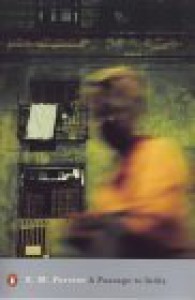 context - from E. M. Forster's letter - his opinions may seem offensive, and I have yet to see whether and how they surface in the novel, so for the time being, I'll mark it as a "to his closest Indian friend Syed Ross Masood - almost certainly the main model for the character of Aziz in A Passage to India, and probably Forster's lover for a short period - explaining the difficulties he was having with the composition of the novel. The tone of the boook had become darker than he intended; he felt much more bitter towards the British after the Amritsar massacre, but he was also less enchanted with the Indians that he had once been:
context - from E. M. Forster's letter - his opinions may seem offensive, and I have yet to see whether and how they surface in the novel, so for the time being, I'll mark it as a "to his closest Indian friend Syed Ross Masood - almost certainly the main model for the character of Aziz in A Passage to India, and probably Forster's lover for a short period - explaining the difficulties he was having with the composition of the novel. The tone of the boook had become darker than he intended; he felt much more bitter towards the British after the Amritsar massacre, but he was also less enchanted with the Indians that he had once been:. Source: Jackson, Kevin. Constellation of Genius: 1922 - Modernism and All That Jazz. London: Windmill, 2013. Print.When I began the book I thought of it as a little bridge of sympathy between East and West, but this conception has had to go, my sense of truth forbids anything so comfortable. I think that most Indians, like most English people, are shits, an I am not interested whether they sypathise with one another or not. Not interested as an artist; of course the journalistic side of me still gets roused ober these questions..." (330)
Slow Life. Zwolnij i zacznij żyć
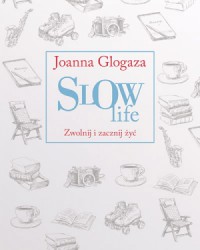 Uczciwe trzy gwiazdki, w znaczeniu - podobało się. Niby ten poradnik drzwi nie wyważa, niby rady zdroworozsądkowe, ale fajnie podane, uczciwie przemyślane, widać, że z nadzieją, że komuś się przydadzą. Mam wrażenie, że ta książka jest lepiej napisana, niż pierwsza książka Joasi (i super), i autorka też lepiej podaje w niej siebie - o ile w pierwszej książce anegdoty o szafiarstwie trochę mnie drażniły, no bo hello, jakiej części z nas dotyczą te problemy, tu widać, że Joasia włącza czytelników/ czytelniczki, także mających dzieci.
Uczciwe trzy gwiazdki, w znaczeniu - podobało się. Niby ten poradnik drzwi nie wyważa, niby rady zdroworozsądkowe, ale fajnie podane, uczciwie przemyślane, widać, że z nadzieją, że komuś się przydadzą. Mam wrażenie, że ta książka jest lepiej napisana, niż pierwsza książka Joasi (i super), i autorka też lepiej podaje w niej siebie - o ile w pierwszej książce anegdoty o szafiarstwie trochę mnie drażniły, no bo hello, jakiej części z nas dotyczą te problemy, tu widać, że Joasia włącza czytelników/ czytelniczki, także mających dzieci.Mnie ta książka chyba (mówię chyba, bo dziś skończyłam) się przydała; cztery lata po urodzeniu dziecka wciąż jestem w jakimś dzikim wirze, i Slow Life pomogło mi się poukładać z tym, że nie wszystko muszę robić, nie wszystko muszę robić wtedy, kiedy mi się wydaje, i że czytanie wcale nie powinno być jedyną rozrywką. Bardzo podobały mi się ćwiczenia pomagające ustalić priorytety, konkretne sposoby dojścia do celu, i czynności do wyeliminowania. Słabszą stroną książki wydały mi się wywiady (fajne wydały mi się dwa z czterech), a sama książka ewidentnie nie jest powtórką z bloga, który wiernie czytam od roku.
Niesamowite przygody dziesięciu skarpetek
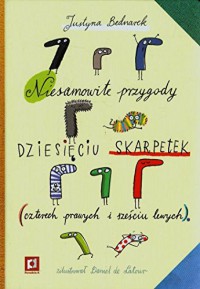 Ładnie wydana (twarda oprawa, zaokrąglone kanty oprawy i rogi kartek), ładnie zaprojektowana (ciekawie wkomponowane ilustracje, czytelna czcionka) i przede wszystkim ujmująca jak jasny pierun - absurdem (w wersji zrozumiałej dla czteroletniego dziecka) i ładnie przemyconymi smaczkami dla dorosłych (ale bez silenia się na śmieszność, czy wprowadzania relatywizmu moralonego - czarne pozostaje czarne, białe białe). Moje dziecko uwielbia tę książkę, my też.
Ładnie wydana (twarda oprawa, zaokrąglone kanty oprawy i rogi kartek), ładnie zaprojektowana (ciekawie wkomponowane ilustracje, czytelna czcionka) i przede wszystkim ujmująca jak jasny pierun - absurdem (w wersji zrozumiałej dla czteroletniego dziecka) i ładnie przemyconymi smaczkami dla dorosłych (ale bez silenia się na śmieszność, czy wprowadzania relatywizmu moralonego - czarne pozostaje czarne, białe białe). Moje dziecko uwielbia tę książkę, my też.
Podróże przez Azję i Europę

Bo cóż innego może robić inteligentna, spostrzegawcza, depresyjna osoba w 1933 roku?Na okolicznych wzgórzach widać małe meczety o spiczastych minaretach, również otoczone cyprysami. Sziraz, podobnie jak Florencja w Toskanii, jest pogodne i sprzyjające sztukom, pełne ogrodów i fontann.
Dzień spędziliśmy w wielkim ogrodzie naszego przyjaciela, Anglika. Dużo myśleliśmy o Europie.
Sądząc po artykułach, które znalazłam w sieci, trudno jest pisać o Annemarie Schwarzenbach bez patosu. Bez wątpienia miała dar dostrzegania i analizowania zła (i lepiej może, że nie przewidziała rozwoju sytuacji na Bliskim Wschodzie – oto, jak oceniła moc islamskiego separatyzmu: )
Jednak te zjawiska, których była świadkiem w Europie, oceniała bezbłędnie: jej szkice o początkach nazizmu, pisane w drugiej połowie lat trzydziestych, choć pozornie mało drastyczne, wywołują ciarki sposobem przedstawienia ekonomicznej i edukacyjnej machiny nastawionej na prześladowanie i marginalizację niechcianych mniejszości oraz pranie mózgu większości, i są, jak dla mnie, przykładem naprawdę dobrego dziennikarstwa i świadectwem dużego talentu. Schwarzenbach, choć nie wolna od naiwności – zwłaszcza we wczesnych szkicach podróżniczych – potrafiła ujmować zjawiska w sposób ponadczasowy: "Buty upuszczone do Innu", jej szkic o bezpaństwowcach, to obowiązkowa lektura dla Europejczyków czasu wielkich nielegalnych migracji.To, czego nie dowiedzieliśmy się w Al-Kazimijja, przyszło nam zrozumieć w Karbali: negatywną moc ducha, który odcina się od świata. Pojawia się również w Europie, gdzie jednak zawsze się wynaturza i przyjmuje straszliwe formy. Tutaj, mając do dyspozycji tysiąc jeden możliwości Orientu, tworzy święte miasto, wyspę sięgającą nie dalej niż pas otaczających je palmowych ogrodów.
Szkice podróżnicze, które z początku mnie nie zachwyciły, wydały mi się bardzo dobre – bardzo opisowe, wywołujące żywe obrazy, w większości surowe w formie, poza rzadkimi poetyckimi fragmentami takimi jak ten poniżej, w którym Schwarzenbach pisze o Turcji:
Po chwili jechaliśmy galopem. Łagodne przejście między wzgórzami a równiną, między rżyskami a suchymi połaciami piasku porośniętymi wysokimi ostami, które konie pokonywały małymi skokami, wydawało się bezkresne. Przemieszczaliśmy się szybko, gwizdał wiatr. Byłam wolna od wszelkiego niezadowolenia i zastanawiałam się, dlaczego Europejczycy czują się tu tak nieswojo.
I wtedy spostrzegłam nad sobą szybującego wysoko sokoła. Przez chwilę oślepiło mnie światło - skrzydło ptaka spotężniało i zasłoniło jaśniejące niebo jak cień księżyca słoneczną tarczę. Spojrzałam w górę, ptak znów znieruchomiał na wysokości. Pomyślałam, że to właśnie jest niebezpieczeństwo. Spostrzegłam, że oddaliłam się od grupy, i pognałam z powrotem.
Pod słońcem. Listy
 3,5 stars, rounded up. I consider teaching Songlines, and, unwilling to spend money on Nicholas Shakespeare's biography of Chatwin, picked up this collection instead. It turned out to be a good resource, tracing the development of Chatwin's ideas, especially On the Black Hill and Songlines (the latter was, as it turns out, an incarnation of Chatwin's earlier unpublished project on nomadism).
3,5 stars, rounded up. I consider teaching Songlines, and, unwilling to spend money on Nicholas Shakespeare's biography of Chatwin, picked up this collection instead. It turned out to be a good resource, tracing the development of Chatwin's ideas, especially On the Black Hill and Songlines (the latter was, as it turns out, an incarnation of Chatwin's earlier unpublished project on nomadism).Since my first exposure to Chatwin, I have failed to see the romance in nomadic lifestyle - one I found easy to champion by a bisexual, childless male. Yet Chatwin's letters told me he also frequently professed hatred for England, didn't want to come out as a bisexual to his parents and brother, and seemed to suffer genuine discomfort whenever he stayed anywhere longer than a month - a condition that could have been traced back to his wartime childhood.
On the whole, I was surprised by how the letters, with their natural dramaturgy, affected me: Chatwin's descriptions of the art world, which, in the seventies, looked positively like Wild West to me; his puzzling approach to art objects, especially towards the end of his life, when his health declined, due to a rare fungal infection AIDS, and his behaviour grew increasingly erratic; his unorthodox, long-distance marriage to his wife, Elizabeth (they would meet for brief spells of time in remote corners of the world - and he would try to postpone these meetings most of the time).
I wasn't bothered by the things which irritated other readers: the selection could have been more careful, I admit, as Chatwin, responding to his letters in batches, frequently used the same phrases to refer to the same situations, but I think this was natural. Shakespeare's commentary provided the much-needed background. I know people some readers referred to Elizabeth's comments as resentful - but she would have to be an oblivious saint in order to feel none.
Anatomia niepokoju, pisma wybrane 1969-1989
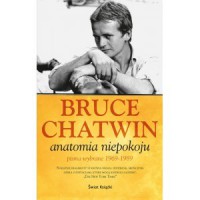 It left me lukewarm, compared to Chatwin's collected letters, which are more informative and consistently rather amusing.
It left me lukewarm, compared to Chatwin's collected letters, which are more informative and consistently rather amusing. The first section, Horreur du domicile, is OK; the second, Stories, quite unremarkable; the third, The Nomadic Alternative, quite redundant if you know the letters; Reviews - might be useful to some, but not many; and the final section, Art and the Image-breaker forms an interesting analysis of Chatwin's attitude to art, possessions, and nomadism.
The Wasp Factory
 Well-written, engaging prose, great for analysis, but on the whole too disgusting for academic purposes.
Well-written, engaging prose, great for analysis, but on the whole too disgusting for academic purposes. The book read was second-hand, and somebody covered the first two pages with comprehensive notes explaining everything there is to explain about the book (spoilers galore), but it didn't ruin my reading displeasure.
Invisible Man
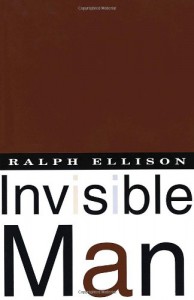 1. I had 39 status updates from this one, most of them quotations. This book is highly quotable. I'm not even sure Invisible Man is a 'good' - i.e. traditional - novel (I will consider this in a moment), but the quotability of this!
1. I had 39 status updates from this one, most of them quotations. This book is highly quotable. I'm not even sure Invisible Man is a 'good' - i.e. traditional - novel (I will consider this in a moment), but the quotability of this! The rhythm of this! (sorry, long sentence ahead, soNow I know men are different and that all life is divided and that only in division is there true health.
(this formatted fragment comes from Ms. Sandra Effinger's materials on Invisible Man from http://mseffie.com/assignments/invisible_man/As I drove,
faded and yellowed pictures of the school’s early days displayed in the library flashed
across the screen of my mind,
coming fitfully and fragmentarily to life --
photographs of men and women in wagons drawn by mule teams and oxen,
dressed in black, dusty clothing,
people who seemed almost without individuality,
a black mob that seemed to be waiting,
looking with blank faces, and
among them the inevitable collection of white men and women in smiles,
clear of features,
striking,
elegant and
confident.
2. The novel is episodic - in fact many chapters, such as Chapter 10 (paint factory), could be anthologized and read in separation. My impression is that Ellison was not really a novel-writer; he would typically write shorter fiction or non-fiction, and this book feels like an amalgam of different speeches, notes, stories, symbolic situations or encounters. Still, this isn't a picaresque novel - it is, in a way, a Bildungsroman, in which the protagonist, very typically of the form, grows to understand his place in the society.
And now all past humiliations became precious parts of my experience, and for the first time, leaning against that stone wall in the sweltering night, I began to accept my past and, as I accepted it, I felt memories welling up within me. It was as though I'd learned suddenly to look around corners; images of past humiliations flickered through my head and I saw that they were more than separate experiences. They were me; they defined me. I was my experiences and my experiences were me (...)
3. The symbolism is very far from subtle (rather, it's one of those situations when you are caught unawares by a symbolic object, again and again, and then every next symbol is greater, and more in your face, and then you're afraid for the narrator to actually look at things because NOOOOO ANOTHER SYMBOL IS COMING AT ME - but in a good way. This is junk food symbolism, easy, pleasant, and satisfying.
4. One of the things that saves this symbolism from being completely in-your-face is the surrealism. The narrator's voice in the beginning reminds me of Holden Caulfield's in its rawness, then starts resempling one of Kurt Vonnegut's narrators (which, luckily, passes). The battle royal, which opens the novel, is surreal, but there are many more instances of this. The Sambo bank section is surreal. Jim Trueblood "Southern gothic" story. The brothel chapter. The 'fantasy rape' scene. The lobotomy chapter (in which a doctor, seeing his black patient writhing from ECT, remarks “They really do have rhythm, don't they?")
5. The racism. All kinds and shades of racism. This book is a catalogue of the black experience, a catalogue of responses to it - from perceiving black Americans as being "the machine within the machine", the disappearance of which would effectively paralyse the entire nation, through the 'Uplift' blacks, to black men, victims of trigger-happy policemen, to lying black educators and administrators manipulating the whites under the facade of obedience and gullibility.
The uncertainty in relations with the whites ("...Is it an insult when one of us tips one of them?") and the racist non-racists:You let the white folk worry about pride and dignity you learn where you are and get yourself power, influence, contacts with powerful and influential people then stay in the dark and use it!
6. The critique of the Uplift movement: the deeply engrained mistrust of one's own race and the desire to out-white the whites. And then the scene in which the unnamed narrator walks down the street and orders a yam (a symbol, again, of the embraced black heritage)."The Brother does not sing!" Brother Jack roared staccato.
"Nonsense, all colored people sing."
"This is an outrageous example of unconscious racial chauvinism!" Jack said.
Quotation to give you a taste of Ellison's style:
"... white folks seemed always to expect you to know those things which they'd done everything they could think of to prevent you from knowing. The thing to do was to be prepared as my grandfather had been when it was demanded that he quote the entire United States Constitution as a test of his fitness to vote. He had confounded them all by passing the test, although they still refused him the ballot..."
Quotation which encapsulates the book's message on race relations in the U.S.:
Our fate is to become one, and yet many -- This is not prophecy, but description.
Thanks to Linda for a great buddy read!
Miasto szczęśliwe. Jak zmienić nasze życie, zmieniając nasze miasta
 Chciałam postawić tej książce 4 gwiazdki - początek jest świetny - ale prócz tego, że jest po prostu zbyt długa, z europejskiej perspektywy rozwiązania proponowane przez autora (rozwój komunikacji miejskiej i rowerowej, zabudowa mieszana, odejście od "płaskich" i oddalonych od centrum miast przedmieści pozbawionych sklepów i punktów usługowych) są codziennością; nasze problemy są nieco inne.
Chciałam postawić tej książce 4 gwiazdki - początek jest świetny - ale prócz tego, że jest po prostu zbyt długa, z europejskiej perspektywy rozwiązania proponowane przez autora (rozwój komunikacji miejskiej i rowerowej, zabudowa mieszana, odejście od "płaskich" i oddalonych od centrum miast przedmieści pozbawionych sklepów i punktów usługowych) są codziennością; nasze problemy są nieco inne.
The Devil in the Flesh
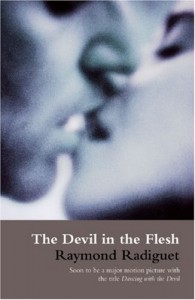 A few weeks ago I finally, happily, concluded that a passive command (sounds oxymoronic) of French is all I need, and started to read Radiguet in the original alongside Polish translation, and found this method very pleasing.
A few weeks ago I finally, happily, concluded that a passive command (sounds oxymoronic) of French is all I need, and started to read Radiguet in the original alongside Polish translation, and found this method very pleasing. This is 3.5 stars for me: the book is elegantly compressed, obsessively so, and I loved being able to follow the construction of sentences and the subversively-built paragraphs:
The voice of the narrator is powerful, and perfectly conveys the sensation of being at the moment of one's life when everything feels intense, raw and clear:Mes sœurs, maintenant, allaient à J… porter des paniers de poires aux blessés. Elles avaient découvert un dédommagement, médiocre, il est vrai, à tous leurs beaux projets écroulés. Quand elles arrivaient à J…, les paniers étaient presque vides!
Still, the book lacks scope - which I understand was intended, but which I always find very annoying in very good books - see [b:Revolutionary Road|48328|Revolutionary Road|Richard Yates|https://d.gr-assets.com/books/1353721885s/48328.jpg|1235136].Si la jeunesse est niaise, c’est faute d’avoir été paresseuse. Ce qui infirme nos systèmes d’éducation, c’est qu’ils s’adressent aux médiocres, à cause du nombre. Pour un esprit en marche, la paresse n’existe pas. Je n’ai jamais plus appris que dans ces longues journées qui, pour un témoin, eussent semblé vides, et où j’observais mon cœur novice comme un parvenu observe ses gestes à table.
Dubliners
 'The Dead' and 'A Mother' were the only ones I really enjoyed; the others, save for brief glimpses of irony, were, above all, horribly boring. Maybe it simply feels too familiar, but I just don't understand what all the fuss is about.
'The Dead' and 'A Mother' were the only ones I really enjoyed; the others, save for brief glimpses of irony, were, above all, horribly boring. Maybe it simply feels too familiar, but I just don't understand what all the fuss is about.
Radical Acceptance: Embracing Your Life With the Heart of a Buddha

I bought this book as a way of expressing gratitude for Tara's podcasts, which helped me get through an Eeyorish spell last year.We spend our life and energy defending our life rather than living it fully.
* The book is a combination of description of monotonously presented, "before-after"-style case studies, Tara's commentary, and guidance on spiritual practice; the podcasts are mostly commentary and guidance.
* There's not much new material in the book for the person who has already been listening to the podcasts for a while, but it gives relatively more (still not much) insight into Tara's personal life, if that's what you're after.
* While I love the way her personality is perceptible in podcasts, the warm humour is nearly all lost in the book, and although I dutifully read it from start to finish, there were only two, maybe three, moments when I really 'connected' to what and how was being written.
If in doubt whether to read/ buy the book, I would advise you to start with podcasts first - you will find them here: https://www.tarabrach.com/talks-audio-video/
Constellation of Genius: 1922: Modernism and All That Jazz
 Argh. This book was not at all what I expected it to be.
Argh. This book was not at all what I expected it to be. Having enjoyed Bill Bryson’s One Summer, I did not necessarily expect a book written in a “this day in history” format, presenting what happened day after day in Paris, London, Moscow, and anywhere D.H. Lawrence travelled. Instead of organised material, we get, quite literally, a collection of trivia. Did I really need to know that Eliot reportedly used "violet face powder to make himself look more cadaverous"? How about D.H Lawrence's stomach bug? "One of Proust's last memorable nights on the town, which turned very ugly"? At best, these are attractive anecdotes for lightening up one’s classes or lectures– such as the one of Zelda’s rebellious review of The Beautiful and the Damned, in which she playfully – and rightly – accused her husband of plagiarizing her diaries and letters.
The book format has inherent formal problems, such as lengthy footnotes (including a three-page-long one on Louis Armstrong), inclusion of barely relevant information on youthful exploits of Gershwin, Hitchcock, and Dali (who, thrillingly, became a university student in 1922!), and rather tedious summaries of “major players’” lives after 1922. All this, along with the fact that the style of the book, while not simplistic, frequently feels too relaxed, simply screams “lazy writing”.
Why is this a keeper, then? I think I am precisely the target audience for this book, which reads like an extended gossip column on dead people I really care about. While obviously not a quotable academic source (meaning I would be ashamed of using it), the book is useful in preparing classes, and it fulfils the promise of its title in at least one respect: it successfully conveys the idea of a ‘constellation’ – it was fascinating to see how nearly all major writers of the period knew many of the others, exchanged letters, impressions, opinions.







